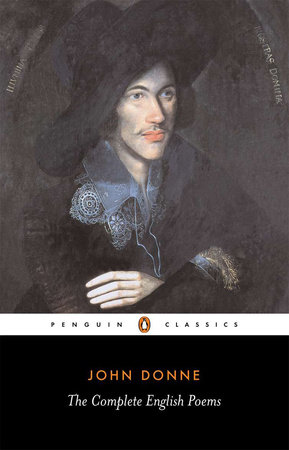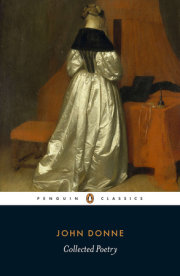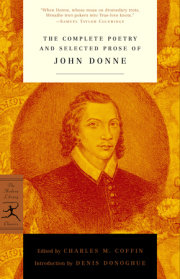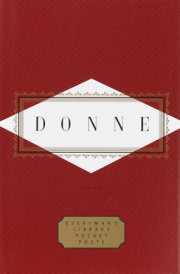The Complete English PoemsPreface
Table of Dates
Further Reading
A Note on the Metre
Songs and SonnetsAir and Angels
The Anniversary
The Apparition
The Bait
The Blossom
Break of Day
The Broken Heart
The Canonization
Community
The Computation
Confined Love
The Curse
The Damp
The Dissolution
The Dream
The Ecstasy
The Expiration
Farewell to Love
A Fever
The Flea
The Funeral
The Good Morrow
The Indifferent
A Jet Ring Sent
A Lecture upon the Shadow
The Legacy
Lovers' Infiniteness
Love's Alchemy
Love's Deity
Love's Diet
Love's Exchange
Love's Growth
Love's Usury
The Message
Negative Love
A Nocturnal upon S. Lucy's Day
The Paradox
The Primrose
The Prohibition
The Relic
Self Love
Song (Go, and catch a falling star)
Song (Sweetest love, I do not go)
Sonnet. The Token
The Sun Rising
The Triple Fool
Twicknam Garden
The Undertaking
A Valediction: Forbidding Mourning
A Valediction: of the Book
A Valediction: of my Name in the Window
A Valediction: of Weeping
The Will
Witchcraft by a Picture
Woman's Constancy
Elegies
1. Jealousy
2. The Anagram
3. Change
4. The Perfume
5. His Picture
6. Oh, let me not serve so
7. Nature's lay idiot
8. The Comparison
9. The Autumnal
10. The Dream
11. The Bracelet
12. His Parting from Her
13. Julia
14. A Tale of a Citizen and his Wife
15. The Expostulation
16. On his Mistress
17. Variety
18. Love's Progress
19. To his Mistress Going to Bed
20. Love's War
Sappho to Philaenis
Epithalamions or Marriage Songs
Epithalamion Made at Lincoln's Inn
An Epithalamion, or Marriage Song on the Lady Elizabeth and Count Palatine being Married on St. Valentine's Day
Eclogue 1613. December 26
Epithalamion
Epigrams
Hero and Leander
Pyramus and Thisbe
Niobe
A Burnt Ship
Fall of a Wall
A Lame Beggar
Cales and Guiana
Sir John Wingfield
A Self Accuser
A Licentious Person
Antiquary
Disinherited
Phryne
An Obscure Writer
Klockius
Raderus
Mercurius Gallo-Belgicus
Ralphius
The Liar
Manliness
Satires
1. Away thou fondling motley humourist
2. Sir; though (I thank God for it) I do hate
3. Kind pity chokes my spleen
4. Well; I may now receive, and die
5. Thou shalt not laugh in this leaf, Muse
Upon Mr. Thoms Coryat's Crudities
The Progress of the Soul (Metempsychosis)
Verse Letters
The Storm
The Calm
To Mr. B. B.
To Mr. C. B.
To Mr. S. B.
To Mr. E. G.
To Mr. I. L. (Blessed are your north parts)
To Mr. I. L. (Of that short roll of friends)
To Mr. R. W. (If, as mine is, thy life a slumber be)
To Mr. R. W. (Kindly I envy thy song's perfection)
To Mr. R. W. (Muse not that by thy mind thy body is led)
To Mr. R. W. (Zealously my Muse doth salute all thee)
To Mr. Rowland Woodward
To Mr. T. W. (All hail, sweet poet)
To Mr. T. W. (At once, from hence)
To Mr. T. W. (Haste thee harsh verse)
To Mr. T. W. (Pregnant again with th' old twins)
To Sir Henry Goodyer
A Letter Written by Sir H. G. and J. D. alternis vicibus
To Sir Henry Wotton (Here's no more news)
To Sir Henry Wotton (Sir, more than kisses)
To Sir Henry Wotton, at his going Ambassador to Venice
H. W. in Hibernia Belligeranti
To Sir Edward Herbert, at Juliers
To Mrs. M. H.
To the Countess of Bedford at New Year's Tide
To the Countess of Bedford (Honour is so sublime perfection)
To the Countess of Bedford (Reason is our soul's left hand)
To the Countess of Bedford (Though I be dead)
To the Countess of Bedford (To have written then)
To the Countess of Bedford (You have refined me)
To the Lady Bedford
Epitaph on Himself
A Letter to the Lady Carey, and Mistress Essex Rich, from Amiens
To the Countess of Huntingdon (Man to God's image)
To the Countess of Huntingdon (That unripe side of earth)
To the Countess of Salisbury
Epicedes and Obsequies
Elegy on the L. C.
Elegy on the Lady Markham
An Elegy upon the Death of Mistress Boulstred
Elegy upon the Untimely Death of the Incomparable Prince Henry
Obsequies to the Lord Harrington, Brother to the Lady Lucy, Countess of Bedford
An Hymn to the Saints, and to Marquis Hamilton
The Anniversaries
An Anatomy of the World: The First Anniversary
To the Praise of the Dead, and the Anatomy
An Anatomy of the World
A Funeral Elegy
Of the Progress of the Soul: The Second Anniversary
The Harbinger to the Progress
Of the Progress of the Soul
Divine Poems
To E. of D. with Six Holy Sonnets
To Mrs. Magdalen Herbert: of St. Mary Magdalen
Holy Sonnets
La Corona
Divine Meditations
1. Thou hast made me
2. As due by many titles
3. O might those sighs and tears
4. Oh my black soul!
5. I am a little world
6. This is my play's last scene
7. At the round earth's imagined corners
8. If faithful souls be alike glorified
9. If poisonous minerals
10. Death be not proud
11. Spit in my face ye Jews
12. Whyare we by all creatures waited on?
13. What if this present were the world's last night?
14. Batter my heart, three-personed God
15. Wilt thou love God, as he thee?
16. Father, part of his double interest
17. Since she whom I loved
18. Show me dear Christ
19. Oh, to vex me
A Litany
The Cross
Resurrection, imperfect
Upon the Annunciation and Passion falling upon one day. 1608
Good Friday, 1613. Riding Westward
To Mr. Tilman after he had taken orders
Upon the Translation of the Psalms by Sir Philip Sidney, and the Countess of Pembroke his Sister
The Lamentations of Jeremy, for the most part according to Tremellius
A Hymn to Christ, at the Author's last going into Germany
Hymn to God my God, in my Sickness
A Hymn to God the Father
Notes
Index of Titles
Index of First Lines










